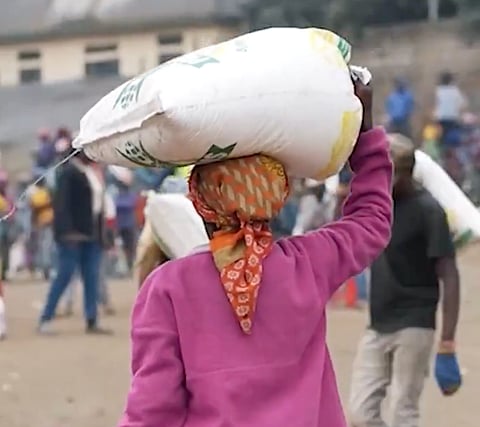

The United Nations has issued a stark warning about a rapidly worsening hunger crisis in eastern Democratic Republic of Congo, where the number of people facing emergency levels of hunger has nearly doubled since last year.
The World Food Programme, a key UN agency, highlighted that over 10 million people in North Kivu, South Kivu, Ituri, and Tanganyika provinces — one in three residents — are experiencing crisis levels of hunger or worse.
Of these, three million are in emergency conditions, marked by extreme food shortages and high malnutrition rates, with reports indicating that people are already dying of hunger.
The surge stems from prolonged conflict and acute humanitarian access challenges, compounded by severe funding constraints that limit aid delivery.
Eastern DR Congo has endured more than three decades of conflict, but recent escalations have intensified the crisis.
The Rwanda-backed M23 armed group resumed operations in 2021 and has since captured major cities like Goma and Bukavu, establishing a parallel administration and controlling nearby mines.
This has displaced 5.2 million people, including 1.6 million this year alone, making DR Congo one of the world's largest internal displacement crises.
Ongoing fighting between M23 militias and government forces continues to force repeated evacuations, preventing subsistence farmers from accessing land and causing millions to miss the planting season.
As a result, families are skipping meals, selling assets and livestock, and depleting household resources in a desperate bid for survival.
Vital services, including banks, have shuttered due to insecurity, devastating livelihoods and exacerbating food insecurity for displaced populations and overburdened host communities.
The WFP's ability to respond has been crippled by record-low funding, receiving only about $150 million this year against a $350 million need for emergency food and nutrition assistance over the next six months.
Aid reach has already dropped from one million people at the start of the year to 600,000 now, with further reductions to 300,000 — mere 10 percent of those in emergency need — looming without additional support.
Logistical barriers compound the issue: airports in Goma and Bukavu have been closed since late January, halting operations.
The agency is closing offices, cutting staff, and reducing its footprint to maintain minimal capacity in this complex environment.
A complete halt of emergency food assistance across eastern provinces is projected for February or March 2026 unless funding surges.
To mitigate access woes, the WFP urges establishment of a humanitarian air corridor from neighboring Rwanda, deeming it safer and more efficient than routes from distant Kinshasa.
Recent years saw funding peaks of $600 million, but 2024 brought $380 million, hit hard by cuts in US foreign aid and European donors shifting budgets toward defense.